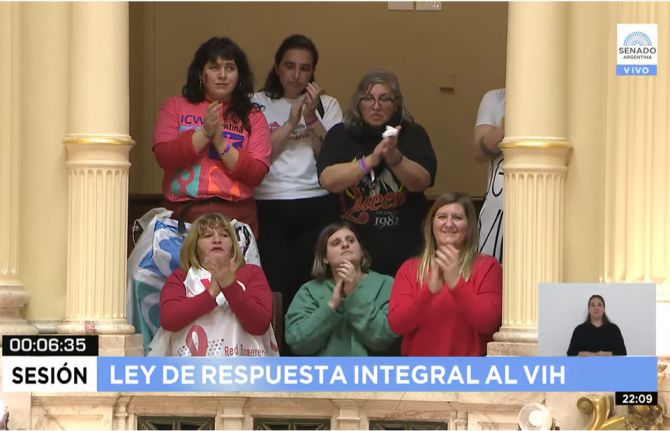



Press Statement
UNAIDS applauds Argentina for the approval of its new human rights-based HIV law
04 July 2022 04 July 20224 July 2022—UNAIDS congratulates the Argentinian Congress on the approval of a new law on a comprehensive response to HIV, viral hepatitis, tuberculosis and sexually transmitted infections (STIs). The bill, which has had input from a number of civil society organizations, replaces 30-year-old legislation and changes the country’s health approach from a biomedical approach to an approach more focused on gender and human rights. The new law calls for an end to stigma and discrimination against people living with HIV or STIs and aims to stop criminalization of HIV exposure or transmission.
By prohibiting mandatory testing for HIV and other STIs as part of pre-employment exams, the new law also seeks to protect against discrimination in all areas (with emphasis on the workplace) and ensures the privacy of the diagnosis.
“We join the civil society and community movements in this important celebration. The new law is evidence-based and written from the perspective of human rights,” celebrates Alberto Stella, UNAIDS Country Director for Argentina, Chile, Paraguay and Uruguay. “The HIV response in the country now counts on a broad framework of social protection, very much in line with the Global AIDS Strategy (2021-2026), which focuses on ending inequalities to end the AIDS epidemic.”
Besides eradicating discriminatory practices, the new legislation also includes the possibility of early retirement at 50 years old for people who have been living with the virus for ten years and who have paid at least 20 years of pension contributions. It also allows access to a non-contributory pension for life in cases of social vulnerability.
The new bill pays a historical debt for dozens of activists who occupied the balconies of Congress in recent voting sessions and the thousands of people living with HIV they represent. “We are one step closer to eliminating barriers to the implementation of self-testing and promoting prevention strategies such as Pre-Exposure Prophylaxis (PrEP)”, celebrated Fundación Huesped, an Argentinian organization with a regional reach that has advocated for the right to health since 1989.
The new law also recognizes specific rights of women, guarantees the right to health of their children and ensures compliance with the rights recognized in the law for the Integral Protection of Women.
“This is the result of the articulated work conducted by civil society who not only led its elaboration but who also did excellent and hard work on advocacy,” says Stella. “Along with the National HIV, TB, Hepatitis and STI department of the Ministry of Health, UNAIDS was able to contribute with advocacy efforts and the facilitation of dialogues, providing evidence and the informing on international guidelines.”
The new bill also proposes the national production of medication and supplies.
The latest estimates from the UNAIDS 2021 Global AIDS Update report show that 140 000 people are living with HIV in Argentina and 65% of whom are on antiretroviral treatment. Every year 5600 people are newly infected with HIV, and 1400 people die from AIDS-related illnesses.
UNAIDS
The Joint United Nations Programme on HIV/AIDS (UNAIDS) leads and inspires the world to achieve its shared vision of zero new HIV infections, zero discrimination and zero AIDS-related deaths. UNAIDS unites the efforts of 11 UN organizations—UNHCR, UNICEF, WFP, UNDP, UNFPA, UNODC, UN Women, ILO, UNESCO, WHO and the World Bank—and works closely with global and national partners towards ending the AIDS epidemic by 2030 as part of the Sustainable Development Goals. Learn more at unaids.org and connect with us on Facebook, Twitter, Instagram and YouTube.
